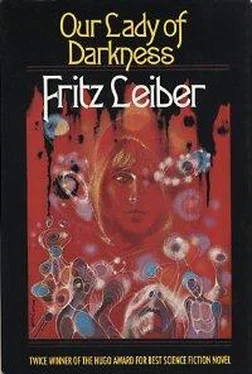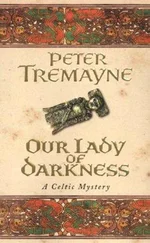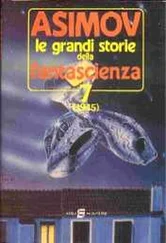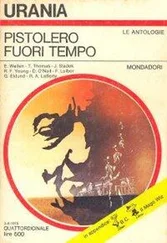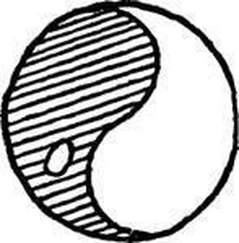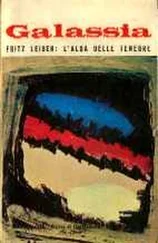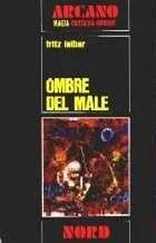“Buildings Anonymous,” Saul remarked without looking up from the reefer he was making.
“Now we do close transom,” said Dorotea, suiting actions to words. “Okay smoke pot. But do not—how you say?—advertise.”
Heads nodded wisely.
After a bit they all decided that they were hungry and should eat together at the German Cook’s around the corner because it was his night for sauerbraten. Dorotea was persuaded to join them. On the way she picked up her daughter Bonita and the taciturn Fernando, who now beamed.
Walking together behind the others, Cal asked Franz, “Taffy is something more serious than you’re making out, isn’t it?”
He had to agree, though he was becoming curiously uncertain of some of the things that had happened today—the usual not-unpleasant evening fog settling around his mind like a ghost of the old alcoholic one. High in the sky, the lopsided circle of the gibbous moon challenged the street lights.
He said, “When I thought I saw that thing in my window, I strained for all sorts of explanations, to avoid having to accept a… well, supernatural one. I even thought it might have been you in your old bathrobe.”
“Well, it could have been me, except it wasn’t,” she said calmly. “I’ve still got your key, you know. Gun gave it to me that day your big package was coming and Dorotea was out. I’ll give it to you after dinner.”
“No hurry,” he said.
“I wish we could figure out that 607 Rhodes,” she said, “and the name of our own building, if it ever had one.”
“I’ll try to think of a way,” he said. “Cal, did your father actually swear by Robert Ingersoll?”
“Oh, yes— ‘In the name of…’ and so on—and by William James, too, and Felix Adler, the man who founded Ethical Culture. His rather atheistic coreligionists thought it odd of him, but he liked the ring of sacerdotal language. He thought of science as a sacrament.”
Inside the friendly little restaurant, Gun and Saul were shoving two tables together with the smiling approval of blonde and red-cheeked Rose, the waitress. The way they ended up, Saul sat between Dorotea and Bonita with Gun on Bonita’s other side. Bonita had her mother’s black hair, but was already a half-head taller and otherwise looked quite Anglo—the narrow-bodied and -faced North European type; nor was there any trace of Spanish in her American schoolgirl voice. He recalled hearing that her divorced and now nameless father had been black Irish. Though pleasingly slim in sweater and slacks, she looked somewhat gawky—very far from the shadowy, hurrying shape that had briefly excited him this morning and awakened an unpleasant memory.
He sat beside Gun with Cal between himself and Fernando, who was next to his sister. Rose took their orders.
Gun switched to a dark beer. Saul ordered a bottle of red wine for himself and the Luques. The sauerbraten was delicious, the potato pancakes with applesauce out of this world. Bela, the gleaming-faced German Cook (Hungarian, actually) had outdone himself.
In a lull in the conversation, Gun said to Franz, “That was really a very strange thing that happened to you on Corona Heights. As near as you can get today to what you’d call the supernatural.”
Saul heard and said at once, “Hey, what’s a materialist scientist like you doing talking about the supernatural?”
“Come off it, Saul,” Gun answered with a chuckle. “I deal with matter, sure. But what is that? Invisible particles, waves, and force fields. Nothing solid at all. Don’t teach your grandmother to suck eggs.”
“You’re right,” Saul grinned, sucking his. “There’s no reality but the individual’s immediate sensations, his awareness. All else is inference. Even the individuals are inference.”
Cal said, “I think the only reality is number… and music, which comes to the same thing. They are both real and they both have power.”
“My computers agree with you, all the way down the line,” Gun told her. “Number is all they know. Music?—well, they could learn that.”
Franz said, “I’m glad to hear you all talk that way. You see, supernatural horror is my bread and butter, both that Weird Underground trash—”
Bonita protested, “No!”
“—and the more serious junk, but sometimes people tell me there’s no such thing as supernatural horror anymore—that science has solved, or can solve, all mysteries, that religion is just another name for social service, and that modern people are too sophisticated and knowledgeable to be scared of ghosts even for kicks.”
“Don’t make me laugh,” Gun said. “Science has only increased the area of the unknown. And if there is a god, her name is Mystery.”
Saul said, “Refer those brave erudite skeptics to my Mr. Edwards or Mrs. Willis, or simply to their own inevitable buried fears. Or refer ’em to me, and I’ll tell ’em the story of the Invisible Nurse who terrorized the locked ward at St. Luke’s. And then there was…” He hesitated, glancing toward Cal. “No, that’s too long a story to tell now.”
Bonita looked disappointed. Her mother said eagerly, “But are e-strange things. In Lima. This city too. Brujas —how you say?—witches!” She shuddered happily.
Her brother beamed his understanding and lifted a hand to preface one of his rare remarks. “ Hay hechiceria ,” he said vehemently, with a great air of making himself clear, ” Hechiceria ocultado en murallas. ” He crouched a little, looking up. “ Murallas muy altas. ”
Everyone nodded pleasantly as if they understood.
Franz asked Cal in a low voice, “What’s that hechi? ”
She whispered, “Witchcraft, I think. Witchcraft hidden in the walls. Very high walls.” She shrugged.
Franz murmured, “Where in the walls, I wonder? Like Mr. Edwards’s pain-ray projector?”
Gun said, “There’s one thing, though, Franz, I do wonder about—whether you really identified your own window correctly from Corona. You said the roofs were like a sea on edge. It reminds me of difficulties I’ve run into in identifying localities in photographs of stars, or pictures of the earth taken from satellites. The sort of trouble every amateur astronomer runs into—the pros, too. So many times you come across two or more localities that are almost identical.”
“I’ve thought of that myself,” Franz said. “I’ll check it out.”
Leaning back, Saul said, “Say, here’s a good idea, let’s all of us some day soon go for a picnic to Corona Heights. You and I, Gun, could bring our ladies—they’d like it. How does that grab you, Bonny?”
“Oh, yes,” Bonita replied eagerly.
On that note they broke up.
Dorotea said, “We thank you for the wine. But remember, double-lock doors and close transoms when go out.”
Cal said, “Now with any luck I’ll sleep twelve hours. Franz, I’ll give you your key some other time.” Saul glanced at her.
Franz smiled and asked Fernando if he cared to play chess later that evening. The Peruvian smiled agreeably.
Bela Szlawik, sweating from his labors, himself made change as they paid their checks, while Rose fluttered about and held the door for them.
As they collected on the sidewalk outside, Saul looked toward Franz and Cal and said, “How about drifting back with Gun to my room before you play chess? I’d sort of like to tell you that story.”
Franz nodded. Cal said, “Not me. Straight off to bed.” Saul nodded that he understood her.
Bonita had heard. “You’re going to tell him the story of the Invisible Nurse,” she said accusingly. “I want to hear that, too.”
“No, it is time for bed,” her mother asserted, not too commandingly or confidently. “See, Cal goes bed.”
Читать дальше
